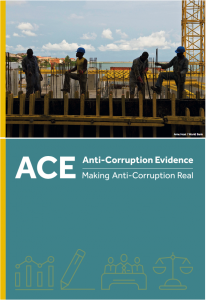
Partners
Led from SOAS University of London, ACE research consortium is made up of 12 global partners. These are the London School of Hygiene and Tropical Medicine (LSHTM), Palladium, the BRAC Institute of Governance and Development (BIGD), Transparency International Bangladesh (TIB), REPOA, the Centre for Democracy and Development (CDD), the University of Birmingham, the BRAC James P. Grant School of Public Health (JPGSPH), Ifakara Health Institute (IHI), the University of Nigeria, the Danish Institute of International Studies (DIIS) and the Economic and Social Research Foundation (ESRF).
Read more about them below.
ACE is engaging with a broad range of public and private sector organizations to ensure our research has impact beyond UK aid and partners and could potentially be used in other countries. Based on our existing research, we believe the ACE approach has the potential to change and improve anti-corruption discourses and efforts globally.
(Image credit: Russell Watkins/DFID)
Founded in 1899, The London School of Hygiene & Tropical Medicine is a world-leading centre for research and postgraduate education in public and global health. Their mission is to improve health and health equity in the UK and worldwide; working in partnership to achieve excellence in public and global health research, education and translation of knowledge into policy and practice.
Founded in 1899, The London School of Hygiene & Tropical Medicine is a world-leading centre for research and postgraduate education in public and global health. Their mission is to improve health and health equity in the UK and worldwide; working in partnership to achieve excellence in public and global health research, education and translation of knowledge into policy and practice.
Palladium is a global leader in the design, development and delivery of Positive Impact — the intentional creation of enduring social and economic value. They work with corporations, governments, foundations, investors, communities and civil society to formulate strategies and implement solutions that generate lasting social, environmental and financial benefits. ACE will work closely with Palladium projects at country level such as Sudokkho in Bangladesh, I4ID in Tanzania and PERL in Nigeria.
The James P Grant School of Public Health (JPGSPH) aims to transform the current system of health delivery through its commitment to contribute to high-quality education and research. Founded in 2004 as the public health wing under BRAC University, the School draws on the inspirational leadership of James P Grant, former executive director of UNICEF, after whom the institution is named. The focus of JPGSPH is to provide access to education, research, training and advocacy though integration and innovation.
Transparency International Bangladesh (TIB) began its activities as a Trust in 1996. In 1998 it obtained the approval of the Government of Bangladesh for registration as a non-governmental organisation. TIB has since been working as a catalyst of social movement against corruption. It has elaborate research and advocacy programmes for policy change and institutional reform for creating conditions for reducing corruption and promoting good governance in Bangladesh.
BRAC Institute of Governance and Development (BIGD), BRAC University is a resource centre for promoting research and creating knowledge in areas of governance, economic growth, political economy, urbanisation, gender issues, sustainable development, and regional studies. It was established in June 2013 through the merger of the then Institute of Governance Studies (IGS) and the BRAC Development Institute (BDI), two institutes of BRAC University.
Founded in 1900, Birmingham University represented a new model for higher education. Its International Development Department (IID) vision is to be part of global effort to achieve the Sustainable Development Goals, to contribute to conflict resolution and post-conflict reconstruction, to help build capacity of nations and communities to adapt to climate change.
The Health Policy Research Group (HPRG) with its base at the College of Medicine, University of Nigeria, Enugu Campus (UNEC) was established in 2003. It is covered by the legal incorporation of the College of Medicine of the University of Nigeria, Enugu-campus.
The Centre for Democracy and Development (CDD) was established in the United Kingdom in 1997 as an independent, not-for-profit, research training, advocacy and capacity building organisation.
CDD set out to generate dialogue on alternative pathways that are universally relevant and context sensitive. The Centre focuses on capacity building work, policy advocacy, and as a research reference point on democratic governance, human security, people-centred development and human rights.
Ifakara Health Institute (IHI) is one of Africa’s most eminent health research organisations. With a history of more than 50 years, IHI is an independent, non-profit organisation, registered in Tanzania and led by Tanzanians.
IHI conducts a wide range of health-related research, including biomedical and environmental studies, trials of drugs, vaccines and diagnostics, health-systems research, and monitoring and evaluation.
The Economic and Social Research Foundation was established in 1994 as an independent, not-for-profit institution for research and policy analysis. The primary objectives of the Foundation are to strengthen capabilities in policy analysis and development management and to enhance the understanding of policy options in the government, the public sector, civil society, and the donor community and the growing private sector.
REPOA is an independent research institution which creates and utilises knowledge to facilitate socio-economic development. REPOA was formed in 1994 in Tanzania with the mandate to contribute to the alleviation of poverty in its multiple dimensions through research and capacity building. Over time, REPOA’s mandate has expanded beyond alleviating poverty to encompass growth and socio-economic transformation for poverty reduction.














